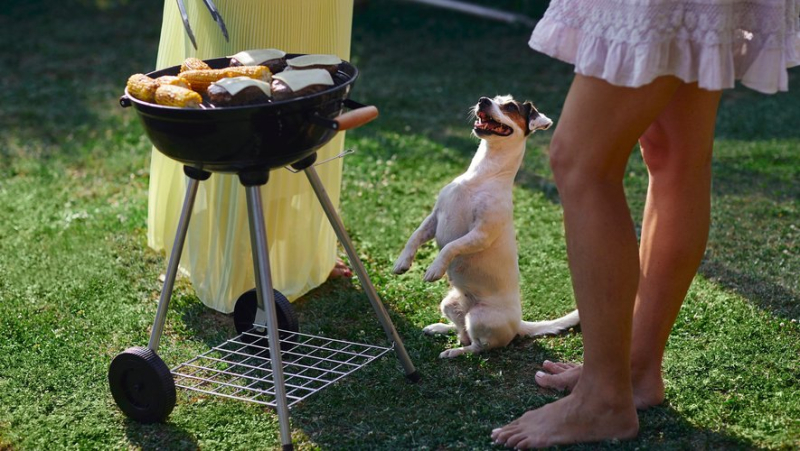What are the best practices to adopt to protect your animal during a barbecue ?

Quand vous faites un barbecue, définissez un périmètre de sécurité pour protéger votre animal de compagnie. vgajic/Getty Images<
When the weather is nice, anyone who has a garden or balcony is tempted to have a barbecue. As friendly as it is, this culinary practice is not safe for pets.
It is essential to take some precautions to prevent things from turning sour.
Don't play with fire
As Charly and Lulu sang, "the fire burns". And we tend to forget that when we grill sausages, steaks or meatballs. However, animals are often attracted by the smells and heat emanating from the barbecue, at the risk of getting burned.
If this happens, keep calm. Dip a cloth in cold water and apply it to the burned area so that the heat does not penetrate the deeper tissues. Do not add ice cubes: this will only accentuate the burn. Also, do not apply grease or cream to the wound. Regardless of the level of severity of the injury, it is best to take the animal to the veterinarian so that appropriate treatment can be implemented.
Keep an eye out for potentially dangerous objects
It seems obvious, but we often tend to leave the tools with which we grill meat, fish or vegetables lying around. It only takes a minute of inattention for your dog or cat to grab it and hurt themselves. Iron skewers can cause serious damage, just like wooden ones. Indeed, these can easily rupture and cause mouth sores which will require veterinary consultation.
Also keep fire starters in a safe place. Their sweet smell strongly attracts animals. But be aware that they are highly toxic to them. If swallowed, go to the veterinarian immediately.
To ensure some peace of mind, define a security perimeter around the barbecue that your pet cannot cross under any circumstances. You can also ask one of your guests to distract your little companion so that he is not tempted to move around your tongs, spatulas and other kitchen utensils.
Beware of bones
It may be tempting to give the bones from the meats you have grilled to your dog, so that he can also enjoy this good meal. But be careful not to give him everything and anything. Once cooked, some bones are more crumbly than others, such as those of chicken, mutton, rabbit or duck. They can easily get stuck in your little companion's throat, or even puncture his stomach or intestines.
It is therefore better to refrain from giving them any, even if they are making eyes at you. Don't feel too guilty about refusing your dog or cat these treats. The nutritional value of bones is more than limited, since cooking has eliminated all the nutrients.
If you absolutely must give your pet a “nonos”, do not cook them. This will prevent them from becoming brittle. Also, choose large, solid bones such as beef bones, and store them in a cool or freezer place beforehand to prevent the proliferation of bacteria. The ideal is, of course, to give your furball a chew bone specially designed for them.
And the leftovers ?
Once the meal is over, many owners give the leftovers to their pet to avoid waste. But this is not always a good idea. Sausages, chipolatas and meatballs are fatty and salty foods that your dog or cat can only eat in very small quantities. As for merguez sausages, it is better not to give them any. Indeed, the spices they contain can irritate their digestive system.
Be careful with seemingly harmless foods, such as garlic, onion and shallot. They are harmful to dogs and cats regardless of their form (raw, cooked, powdered, etc.). Also be very careful with guacamole: avocado flesh is toxic to our little companions, especially if consumed in large quantities.




